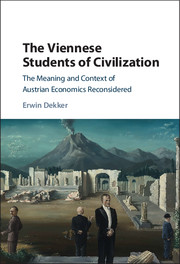The Tensions in Austrian Economics
By Arnold Kling

The tension… between mythos and logos, between political ideals and understanding is central in their entire body of work. It is this tension, with which they struggled so deeply, that explains the tension in their work between an emphasis on uncertainty in their theoretical work, and the conviction of their political work.
—Erwin Dekker, The Viennese Students of Civilization: The Meaning and Context of Austrian Economics Reconsidered,1 page 166.
In The Viennese Students of Civilization, Erwin Dekker provides a new interpretation of the work of Ludwig von Mises, Friedrich Hayek, Joseph Schumpeter, and other economists of the Austrian school. In the process, he identifies a number of tensions in their thought: the economist as detached observer versus the economist as political participant; progress versus decline; liberty versus restraint; individualism versus culture; modernity versus tradition; and what Jacob T. Levy would call rationalist versus pluralist.2
For some background on Austrian Economics, see Austrian School of Economics, by Peter J. Boettke, in the Concise Encyclopedia of Economics and the EconTalk podcast episode Boettke on Austrian Economics, December 2007. See also The Foundations of Modern Austrian Economics, Edwin G. Dolan, ed., at the Library of Economics and Liberty.
Dekker narrows the geographic origins of the Austrian school to Vienna. He argues that the outlook of Austrian economists was influenced by the fact that Vienna was an intellectual paradise set within an empire in a state of decline.
Viennese intellectual life was not dominated by academic universities. Instead, it was centered on the overlapping discussion groups known as Viennese circles. Says Dekker,
… the character of the knowledge that emerged from these circles differed from that produced in strictly academic settings. While in many other European countries modern universities were coming to dominate the intellectual atmosphere, Viennese intellectual life took place within the social sphere. While [elsewhere] knowledge production became organized along disciplinary lines… intellectual life in Vienna remained both broad and relatively informal. (pages 29-30)
The conversation, or the seminar, was the center of Viennese intellectual life… Not experiments, not armchair observations, not statistical methods, not modeling, but talking. (page 44)
However, the fact that the Austrian empire was reeling from a series of crises forced the Viennese economists to focus on the causes of the progress and decline of civilizations. For example, these economists were inclined to take what Jacob Levy calls the “pluralist” view that society benefits from a multiplicity of group and organizational interests. However, they witnessed the retreat from liberalism, as the Habsburg Empire could not broaden political participation without splitting along ethnic lines. Hence,
The German liberals in Austria… favored a centralist system in which their universal principles could dominate and in which parties were not based around regional or national issues, but around universal issues, such as the social and economic order. (page 56)
Another tension concerns individualism. On the one hand, the Austrian economists are known as methodological individualists. On the other hand, they saw individuals as embedded in culture.
Hayek argues that civilization makes individual autonomy possible, and that individual actions contribute to that civilization. In no straightforward way can this be called methodological individualism… Economic laws are no longer natural; they are cultural or civilizational processes. (page 65)
The clash between modernity and tradition involves the fact that modernists seek to have a rational explanation for everything, while the Austrian economists believed that many cultural practices had evolved organically rather than being the products of rational design.
[Mises] realizes that it is a particularly modern problem that a rational justification for every norm is necessary… In the metaphysical natural law tradition, property was always believed to be sacred. Liberalism has destroyed this belief… property has become a means toward other goals. (page 80)
… the Viennese students of civilization argue that we cannot fully know or understand our civilization, and hence we should be very careful in trying to reconstruct it rationally. The organically grown institutions often contain a lot of knowledge, which is not always easily accessible to the student of civilization… Hayek argues that culture makes individual autonomy possible; cultural institutions such as language and markets ‘make us intelligent’. Intelligence for him is a cultural product, and that implies limitations to what we can know about that culture… we cannot step outside our own civilization to observe it… as is the ideal in natural science. (page 12)
Austrian economists also are known as strong advocates of individual liberty. However, they see liberty as possible only if it is exercised with restraint. Dekker writes,
… there is, contrary to my expectation, a surprising consensus on what the central element is of any type of civilization: restraint. Hayek… argues that civilization has become possible through restraint: the restraint of our natural inclinations, our instincts. But also, and that is especially important for Hayek, the restraint on our rationalism, the recognition of the limits of our rational faculties: our ability to know and design. (page 7)
… the escape from barbarism comes at a price… Hayek and Popper… believe that civilization comes at a severe price, so much so that we must conclude that man is (at least initially) civilized against his wishes… Freud… concludes that this price might become unbearably high…
… freedom, for all these thinkers, is only possible through restraints: freedom is made possible by civilization. Civilization, the norms and institutions which regulate human interaction, enable us to be free. A good example of an institution which enables freedom is division of labor. By the division of labor the possibilities for human flourishing multiply, but it does mean that we become dependent on others, and that we will only produce a small part of the wide array of goods we desire… Our freedom is dependent on the fact that other people share our civilization, and do not permanently revolt against it. (page 8)
Dekker argues that the Austrian theory of capital and interest is linked to this view of civilization as restraint.
A relatively low interest rate can then be interpreted as a sign that people are relatively easily motivated to abstain, and the Viennese students of civilization did not hesitate to consider low interest rates as a sign of an advanced civilization. (page 85)
The tension that Dekker emphasizes the most is that between detached observer and participant. Austrian economists respect civilization as an emergent order and are skeptical of attempts to design society using rational expertise. This makes them much less inclined than other economists to be policy activists. Dekker notes that some prominent 19th century Viennese physicians were similarly skeptical about medical intervention.
The strong emphasis on knowledge instead of healing, combined with the conviction that the healing powers of the doctor were limited by the laws of nature, have led many critics of [19th century physician Joseph Dietl] to call him a ‘therapeutic nihilist’ (page 113)
I found this an interesting analogy to ponder. Imagine that a doctor you were consulting about a malady were to say, “I am not going to intervene, because we do not know enough about the human body to be confident that we are going to do more good than harm. Instead, I am just going to study the phenomena of health and illness.”
“Citizens and politicians have a natural inclination to favor economists who propose treatments for economic ills and to disdain economists who think that the private sector is best left alone to heal itself.”
Historically, and even today, doctors have intervened in ways that harmed or even killed their patients. However, we have a natural inclination to favor doctors who propose active treatments and to disdain doctors who would merely be passive observers. Similarly, citizens and politicians have a natural inclination to favor economists who propose treatments for economic ills and to disdain economists who think that the private sector is best left alone to heal itself.
Dekker points out that by turning toward polemical writing, such as Hayek’s The Road to Serfdom, the Austrians were showing that they were no longer content to rest on the sidelines. They felt an obligation to attempt to arrest the decline of liberalism.
In conclusion, I would suggest that the tensions in Austrian economics that Dekker elucidates have not been resolved. On the contrary, they continue to bedevil economists who share the Austrian outlook.
Erwin Dekker, The Viennese Students of Civilization: The Meaning and Context of Austrian Economics Reconsidered. Cambridge University Press, 2016.
See the discussion at “Jacob T. Levy, ‘Rationalism, Pluralism, and the History of Liberal Ideas’ (May 2016)”. Online Library of Liberty.
*Arnold Kling has a Ph.D. in economics from the Massachusetts Institute of Technology. He is the author of several books, including Crisis of Abundance: Rethinking How We Pay for Health Care; Invisible Wealth: The Hidden Story of How Markets Work; Unchecked and Unbalanced: How the Discrepancy Between Knowledge and Power Caused the Financial Crisis and Threatens Democracy; and Specialization and Trade: A Re-introduction to Economics. He contributed to EconLog from January 2003 through August 2012.
For more articles by Arnold Kling, see the Archive.

